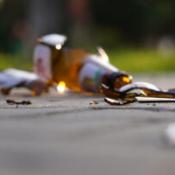 In my practice as an addiction psychologist, it’s probably the most common question I encounter; when it comes right down to it, it’s what most people who are struggling with alcohol really want to know:
In my practice as an addiction psychologist, it’s probably the most common question I encounter; when it comes right down to it, it’s what most people who are struggling with alcohol really want to know:
“How can I control my drinking or drug use?”
Only a small minority of people come to my practice with the expressed agenda of stopping their drinking altogether. Most seeking psychotherapy for alcohol dependence, misuse, or abuse have experienced some consequences due to their drinking and would like to minimize or stop those consequences but do not want to give up their drinking entirely.
For some drinkers, controlled drinking or moderate drinking is an option, and for a small portion of the population, about 5%, controlled drinking is nearly impossible. While many people believe “once an alcoholic, always an alcoholic,” many people diagnosed with alcoholism can learn to control their drinking and become social drinkers again. That said, if you have been diagnosed with alcohol dependence, most addiction psychologists, psychiatrists, physicians, social workers, and addiction counselors would strongly recommend abstinence. This is always a very personal decision that should be made with careful consideration of the risks and benefits of drinking versus abstinence.
If one has never exhibited signs of alcoholism, then controlled drinking, a technique or approach that is a form of harm reduction, is a reasonable yet delicate first step. If one wants to pursue this approach, it is best not to go it alone. Talking to an addiction psychologist or other addiction professional can guide you through some generally recommended techniques.
Notice Feelings and Set Limits
Most addiction therapists will recommend two basic procedures that may differ in numerous ways but have the same central premise. The first is that you cut back your use of alcohol in whatever way you decide and that you then pay attention to what thoughts and feelings emerge. The idea here is that alcohol serves to mediate feelings by numbing, dulling, or blocking them entirely, and when you reduce your use or even stop drinking, your feelings will come back. As this happens, it is often recommended that you keep a journal or that you talk to your friends, family, partner, or therapist about these thoughts and feelings.
The well-known acronym “HALT” captures this eloquently. HALT stands for Hungry, Angry, Lonely, and Tired. These are the types of feelings people will experience as they reduce their alcohol or drug use. It reminds us to halt, or stop, and pay attention to what we need. Somehow, we have to cope with those feelings or risk relapse. If you are hungry, then eat. If you are angry, then tell someone, vent, exercise, pound a pillow, or express your anger in a healthy way. If you are lonely, then surround yourself with friends or start the process of finding new ones if all your friends drink. If you are tired, then sleep. Many people with alcoholism have an inability to take care of themselves, and learning this new skill in recovery is essential even with such basic behaviors as eating and sleeping.
A second basic tenet to alcohol counseling for people who are attempting moderate or control their drinking is to pick an amount of alcohol that they will not exceed and to stick with it. The National Institutes of Health recommend that, to maintain “low-risk drinking,” men consume no more than four drinks per day and no more than 14 per week. For women, the number is no more than three per day and seven per week. My personal belief is that this is fairly generous; a man can drink four beers while at a party on Friday or Saturday night, three or four during the football game on Sunday, three or four at bowling or poker night with the guys, and still have two or three with his partner on another day during the week.
When we can learn to stop at the “buzz,” we are well on our way to having our relationship with alcohol fully in check. For most people, three or four drinks make them feel tipsy or buzzed. Alcohol is a central nervous system depressant, yet the initial effects of alcohol in these amounts are more stimulating and euphoric feeling. People tend not to get into serious trouble from these amounts, but since the initial effects feel good, many people continue to drink past these amounts, assuming more alcohol equates to more good. It does not. It takes time for alcohol to work itself into your system, so people don’t realize how drunk they are getting, and in larger amounts alcohol has a depressing effect. The alcohol you drink today can make you feel depressed days and weeks later, and these small amounts can contribute to depressive feelings over time. Rarely has anyone come into my office with concerns about alcohol abuse because of drinking three or four drinks a few times a week.
Other Useful Techniques
To stick to the above drinking goals, there are other moderate drinking techniques that you can employ, such as avoiding hard alcohol and sticking to beer. Beer has lower ethanol content, and the carbonation can fill you up, so it tends to take longer to drink. Switching from alcohol to nonalcoholic drinks and back can slow you down as well. Holding a drink with lime or lemon may deter others from thinking you are not drinking an alcoholic mixed drink, and they may be less likely to offer you another drink. Remember, you are more aware that you are not drinking your normal amount or that you have reduced your consumption, and others probably aren’t even aware that you made any changes.
One technique to help you be honest with yourself is to take four coins (or as many coins as you are planning to have drinks that night) and place them in your back pocket. Each time you take a drink, move one of the coins into your other pocket. This may be more important if you are planning on drinking larger amounts of alcohol, and many of the people I work with start out reducing their drinks per setting with numbers more like from 10 to five or six, for example, so counting drinks becomes more important. This way, when your coins run out, you can be sure not to exceed the previously determined limit that you imposed on yourself.
Many addiction therapists recommend one drink per hour as another way of limiting oneself. Since alcohol leaves the bloodstream at about .02 blood alcohol content (BAC) per hour, this will most likely keep your BAC at a reasonably safe level. In using this technique, it is recommended that you discuss your upper limit with a certified addiction professional or addiction psychologist.
It goes without saying that it’s important to pay attention to drink equivalents. A typical shot equals one 5-ounce glass of wine, which equals one 12-ounce standard beer. If your favorite bartender is pouring your drinks and he knows you are a big tipper who likes to drink, you might need to have a brief conversation with him. Believe me, bartenders are used to these conversations, and they will not hold it against you. In fact, most bartenders will be very respectful and discreet and will keep an eye out for you thereafter. If your buddies are trying to get you drunk, that’s another story. Watch how much they pour. A Long Island Iced Tea counts for three drinks, not one.
Don’t Try to Drink Away Emotional Pain
While I consider myself to be an open-minded therapist, what would an alcohol blog be without a major caution? Here’s my warning: Don’t drink when you are sad, anxious, lonely, worried, or in any negative feeling state. These are times when you should figure out healthy ways of coping. If you drink during these times, you are at high risk for using your drinking as a crutch.
What happens if you can’t control your alcohol use with these techniques? After trying these techniques and determining your level of success, you should be able to assess whether you can be a social drinker. To the extent that you break any of the rules that you set up as an experiment and exceed these drinking limits with resulting consequences, then it is time to reconsider lowering your upper drinking limits and decreasing the frequency, quantity, intensity (alcohol content), or duration of your alcohol use.
If you are wondering whether you have a drinking problem, please read Do I Really Have a Drinking Problem?
An addiction psychologist or other psychotherapist specializing in addiction can help you answer any questions or develop a plan that, over time, will enable you to understand the role that alcohol plays in your life and make decisions about what, if any, changes you are ready to make. You don’t need to figure this out on your own. It takes courage to seek help for alcohol use. If you are reading this, you are well on your way to understanding yourself better and getting what you want and need in life.

The preceding article was solely written by the author named above. Any views and opinions expressed are not necessarily shared by GoodTherapy.org. Questions or concerns about the preceding article can be directed to the author or posted as a comment below.

 Are You Hooked? Recognizing Addiction Signs in Yourself and Others
Are You Hooked? Recognizing Addiction Signs in Yourself and Others Three Reasons to Leave: Abuse, Addiction, and Affairs
Three Reasons to Leave: Abuse, Addiction, and Affairs Scars of Addiction: How to Help Children of Addicted Parents
Scars of Addiction: How to Help Children of Addicted Parents

